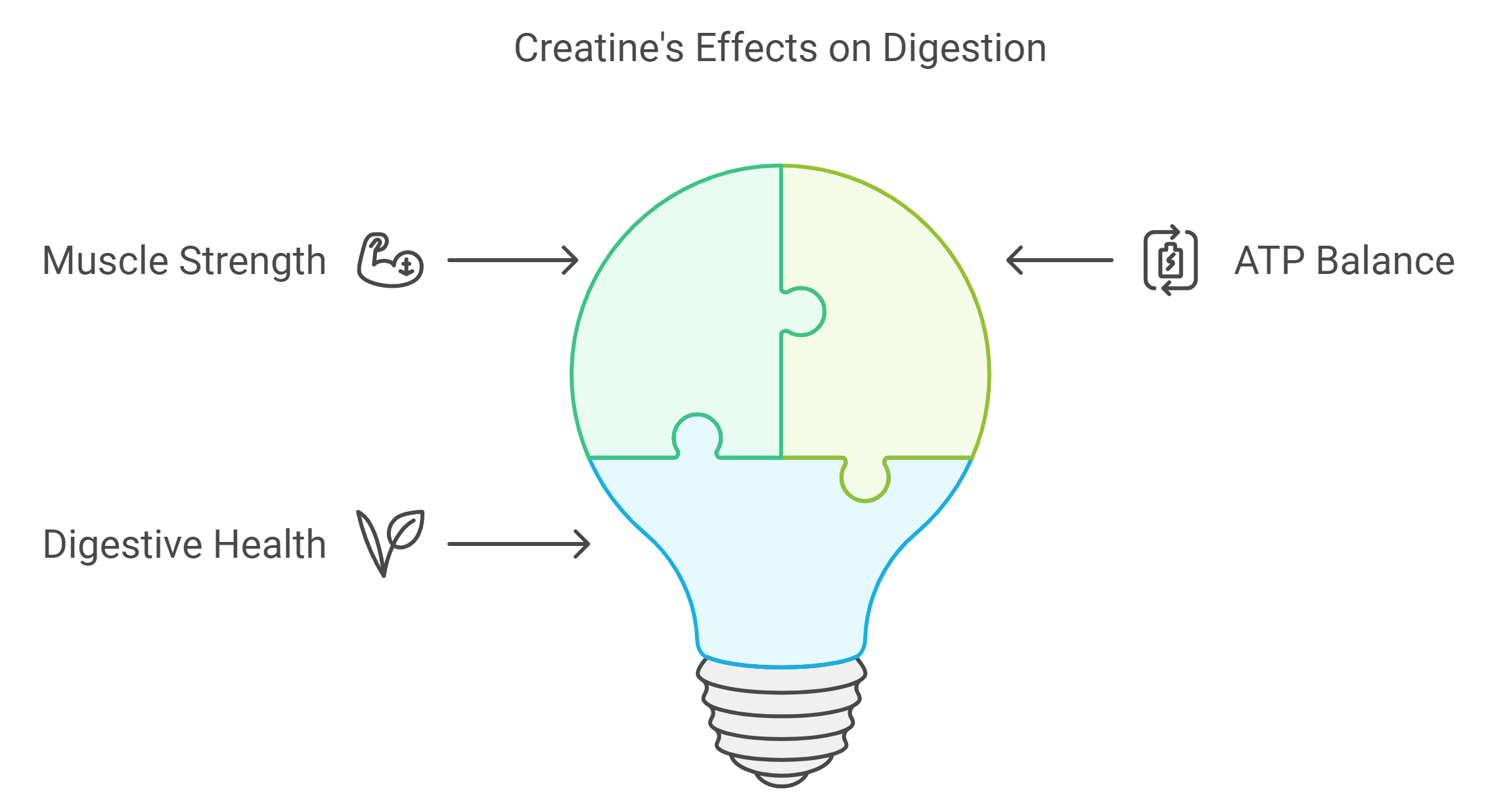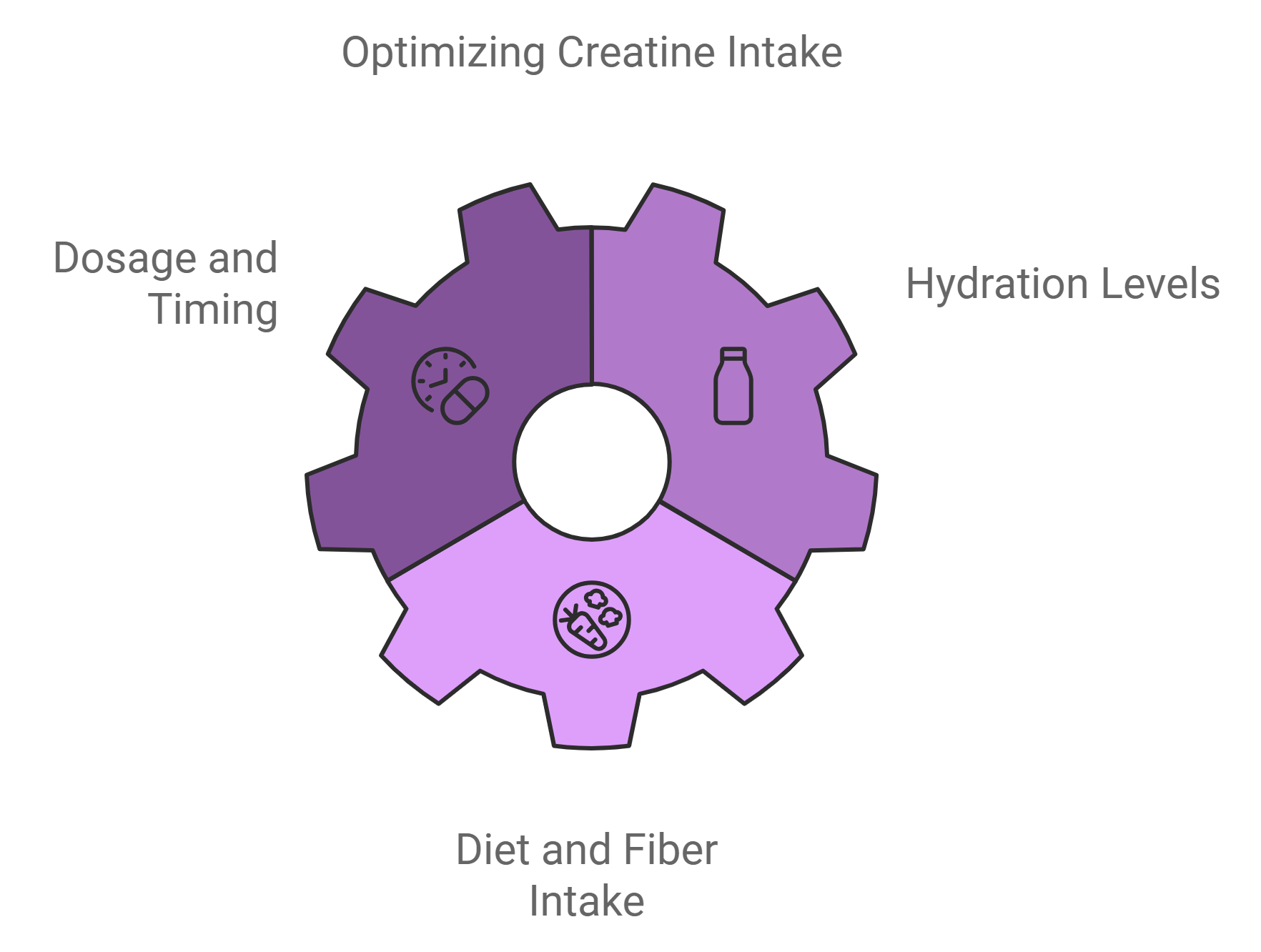Introduction
Some users of creatine can increase bowel movements. Not everyone is susceptible to this effect, but it may occur due to one or two reasons: improper dosing or improper timings. Under certain conditions of dosing, especially when large doses are taken during the loading phase, the amount of creatine could be too much to absorb at once.
Hence, this disturbs digestion. This could cause diarrheas or stomach cramps. Sticking to recommended dosing and hydrating well will help minimize these effects.
How Creatine Impacts Digestion?
Creatine is among the top-selling sports supplements especially when it comes to increasing muscle strength and endurance. This is through increasing the ATP balance, which is related to transport of energy at the cellular level and is very essential when one exercises to high levels.
However, many of the users get an upset in their digestive health while using the substance. This phenomenon can be explained by a lot of factors: how your body starts to react to a larger amount of creatine inside the organism and how creatine influences your digestive system.

Why Does Creatine Have Such An Effect on Digestion?
Sometimes, it is a directly linked effect to the osmotic properties. Creatine does what many other nutrients can do: it drags water into the muscles. The problem with this is that it may be carrying or forcing more in the intestines than some people also.
This osmotic effect can then lead to diarrhea or an increased frequency in bowel movements, especially when taken in higher doses. Another note regarding creatine absorption is that its formulations are sometimes spiked with other additives and fillers, which are prone to easily inflame the digestive lining.
Factors Affecting Digestive Response
Dosage and Timing
The dosage of creatine intake is one key determinant for its digestive effect. A high dose, more in the case of a loading phase, may be related to GI distress. Loading phases usually involve a daily dose of 20 grams, split into multiple portions.
This can create a shock in the digestive system with such a high dose and may cause bloating, diarrhea, cramps, and other symptoms. It is good to start with lower doses and work up higher as time passes to avoid this.
Hydration Levels
One should always keep adequate hydration during the administration of creatine. Since it increases water retention in muscles, the absence of adequate intake of water can lead to dehydration.
Dehydration will raise the experienced digestive upset, and constipation and cramping could be added. Taking lots of water during the day is going to help the body in digestion and assimilation of creatine while reducing the chance of gastrointestinal distress.
Diet and Fiber Intake
This also depends on how your diet is constituted. If you have a very low fiber diet, then you are definitely going to get constipated, and suddenly eating a lot of dietary fiber may make you only bloated and gassy.
Having a diet rich in foods that can provide a healthy serving of fiber, especially from fruits, vegetables, and whole grain food sources, can easily provide you with healthy movements of the bowel and less likely to be having diarrhea after ingesting creatine.

How to Take Care of Digestive Health While Supplementing with Creatine
Dosages Can Be Taken
Maintenance of the recommended dosages for creatine also minimizes any digestion-based side effects associated with it. The standard dosage post-loading phase is 3-5 grams daily.
Any more than this dose makes one more susceptible to the gastrointestinal disturbances brought about by the supplement. Careful dosing and not over-consumption would not tax the digestive system unnecessarily.
Stay Hydrated
Also critical to note is keeping the body well-hydrated when taking creatine supplements. Water is vital in the easy transportation and absorption of creatine into the muscle tissue. Sufficient water intake also helps avert dehydration, which can provoke digestion difficulties. Take at least eight glasses of water each day and more if you are going to have an extremely hard workout.
Gradual Increase of Fiber
Increased intake of dietary fiber can reduce, and at times even completely avoid, initial digestive intolerances that go with creatine supplementation.
Have small introductions to sources of dietary fiber and increase tolerance through the gut. This would help with common problems associated with creatine supplementation: bloating, gas, and diarrhea.
FAQs
Can Creatine Cause Diarrhea?
Yes, creatine can, in fact, give one diarrhea, especially when taken at very high dosages and without being well-hydrated. Creatine has osmolytic effects that result in drawing water within the intestines, which may lead to watery stools.
How Can I Reduce Gastrointestinal Side Effects with Creatine?
Take only the recommended dosage; ensure lots of water intake to help digestion; consume fiber-rich food to minimize the occurrence of stomach upset. The dose may also be sub-divided and spread over the course of the day.
Am I supposed to discontinue taking creatine if I have stomach issues?
Common digestive symptoms are temporary during the initial creation, but people are advised to contact a healthcare professional if they are persistent and/or severe to check the situation and discuss what’s next.
How long do you typically experience digestive side effects with creatine?
As a side effect of using creatine, gastrointestinal disturbances, in most cases, are temporary and should clear up either with body adjustment or dose adjustment. Continued symptoms, however, should get medical attention.
Conclusion
Knowing what creatine may do to digestion, one can reduce the discomfort by keeping the suggested dosages, staying well-hydrated, and consuming adequate fiber to avoid gastrointestinal problems. Always consult a health professional before taking any supplement to know it will not have an interaction with medications being taken or an adverse effect on any particular health concerns and goals.

